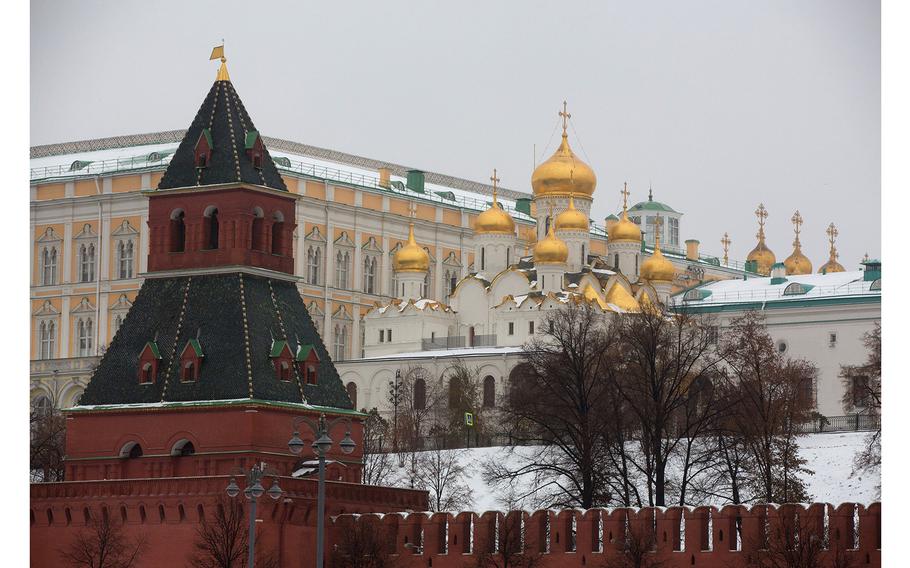
Golden church domes sit beyond fortified walls in the Kremlin palace complex in Moscow, Russia, on Nov. 10, 2016. (Andrey Rudakov/Bloomberg)
(Tribune News Service) — Russia is devising a legal challenge to snarl any efforts by the US or Europe to confiscate some of its $300 billion in frozen central bank assets in favor of Ukraine, according to people familiar with the matter.
Officials in Moscow, who are studying the possibility of the funds being seized, have concluded such an outcome is unlikely, they said, asking not to be identified because the information isn’t public. The Bank of Russia is currently nearing an agreement with international law firms to represent the country’s interests in case of a court showdown.
Authorities also commissioned expert views analyzing the relevant legislation abroad and precedents in other countries, the people said.
Urgency has grown for Russia at a time when discussions intensify among the US and its allies over the fate of the holdings blocked days after the February 2022 invasion of Ukraine. The issue is also in the spotlight with political divisions in the US and the European Union holding up more than $110 billion in aid to the government in Kyiv.
In a shift for President Joe Biden’s administration, it’s now backing legislation that would let it seize some of Russia’s assets, Bloomberg reported this week. The White House wants to align the move with Group of Seven allies, particularly in Europe, where about about two-thirds of the frozen Russian funds are held and where support for seizure, particularly unilaterally, has been tepid.
The Bank of Russia declined to comment on its plans. When asked about the repercussions of possible steps taken by the West, the Kremlin’s spokesman, Dmitry Peskov, said Russia would challenge them in court and warned it could retaliate, according to the state-run Tass news service.
Serious costs
This will entail “very serious judicial and legal costs for those who make such decisions,” Peskov was quoted as saying on Thursday.
Going the legal route was an option long floated by top Russian officials, with central bank Governor Elvira Nabiullina saying last July it was “almost ready” to challenge the freeze. In a December interview with the RBC newspaper, she called it “a very negative signal for all central banks, because it is a violation of the basic principles of reserve security.”
Officials involved in the discussions are confident that pursuing the case in courts would prevent any transfer of the funds to Ukraine even if Russia is unable to wrest control of the money, the people said.
Their view is that the West stands little chance in court and has no legitimate grounds for seizure based on legislation adopted after the freeze, they said.
The arguments echo analysis published last month by the state-backed Roscongress Foundation, a development institution and major event organizer in Russia.
The report, which surveyed the experience of freezing and confiscating assets of countries from Iraq to North Korea, found that the “real risks” that Russian central bank reserves could be seized “remain low.”
Decades in court
In the absence of clear international legislation, any attempts to take over the holdings will rely on domestic laws of states that have imposed sanctions on Russia, it said. As a result, Russia should be able to challenge decisions on its immobilized reserves, leading to litigation that “could last for decades, with unclear prospects,” according to Roscongress.
The money will likely remain blocked until relations with Russia stabilize or a common solution emerges, it said. “More decisive actions in relation to the frozen assets will lead to the outflow of trillions of dollars from the United States to other jurisdictions.”
Russia’s legal recourse depends on the circumstances of actions taken and whether there’s a bilateral agreement on protection of investments, according to Sergey Glandin, a partner at BGP Litigation in Moscow who specializes in compliance and sanctions law.
Possible avenues for Russia could include the International Court of Justice in The Hague or the US District Court for the Southern District of New York and the EU’s Court of Justice in Luxembourg, he said.
An attempt to take over the assets will lead to multiple legal disputes in court “for many years,” Glandin said, warning of a “war of confiscations” in response.
Visit bloomberg.com
©2024 Bloomberg L.P.